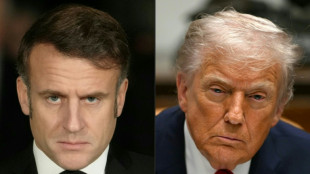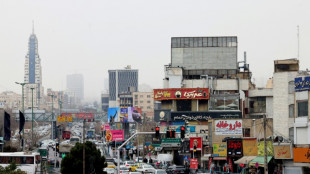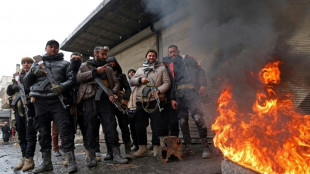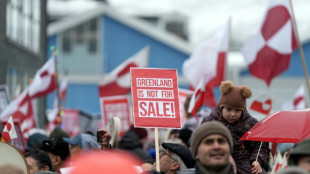-
 Morocco coach Regragui laments 'shameful' scenes in AFCON final defeat
Morocco coach Regragui laments 'shameful' scenes in AFCON final defeat
-
Maye, Boutte wonder-catch carry Patriots past Texans

-
 Train collision in Spain kills 21, injures dozens
Train collision in Spain kills 21, injures dozens
-
Brazilians Abner, Endrick help Lyon climb to 4th in Ligue 1

-
 Barca beaten at Real Sociedad as Liga title race tightens
Barca beaten at Real Sociedad as Liga title race tightens
-
Socialist to face far-right candidate for Portugal's presidency

-
 Senegal stun hosts Morocco to win AFCON title after final walk-off protest
Senegal stun hosts Morocco to win AFCON title after final walk-off protest
-
Syria's leader agrees truce with Kurds after govt troops advance

-
 Morant shines as Grizzlies top Magic in London
Morant shines as Grizzlies top Magic in London
-
Real Sociedad end Barca winning streak to tighten Liga title race

-
 Senegal stun hosts Morocco to win AFCON title after ugly scenes mar final
Senegal stun hosts Morocco to win AFCON title after ugly scenes mar final
-
AC Milan in touch with Inter thanks to Fullkrug's first Serie A goal

-
 Lyon climb to fourth in Ligue 1 with victory over Brest
Lyon climb to fourth in Ligue 1 with victory over Brest
-
Morant shines as Grizzles top Magic in London

-
 Trump admin orders 1,500 troops to prepare for possible Minnesota deployment
Trump admin orders 1,500 troops to prepare for possible Minnesota deployment
-
Limited internet briefly returns in Iran after protest blackout

-
 South Africa declares national disaster as floods batter region
South Africa declares national disaster as floods batter region
-
Gang members in Guatemala kill seven police after prison crackdown: minister

-
 Villa's title bid rocked by Everton loss, Newcastle held at Wolves
Villa's title bid rocked by Everton loss, Newcastle held at Wolves
-
Dybala boosts Roma's Champions League hopes, Fiorentina honour Commisso

-
 Villa's title bid rocked by Everton loss, Newcastle held by Wolves
Villa's title bid rocked by Everton loss, Newcastle held by Wolves
-
'Avatar: Fire and Ash' at number one in N.America for fifth straight week

-
 Limited internet returns in Iran after protest blackout
Limited internet returns in Iran after protest blackout
-
Syria's leader agrees truce deal with Kurds after govt troops advance

-
 Smith's penalty sees Quins eliminate La Rochelle, Bordeaux secure top seeding
Smith's penalty sees Quins eliminate La Rochelle, Bordeaux secure top seeding
-
Atletico edge Alaves to strengthen Liga top-four hold

-
 Uganda president says opposition 'terrorists' in victory speech
Uganda president says opposition 'terrorists' in victory speech
-
New Zealand register first ODI series win in India despite Kohli ton

-
 Elvira wins Dubai Invitational after Lowry's last hole meltdown
Elvira wins Dubai Invitational after Lowry's last hole meltdown
-
Jeong snatches Union late draw at Stuttgart in Bundesliga

-
 Man Utd's Martinez hits back at Scholes after height jibes
Man Utd's Martinez hits back at Scholes after height jibes
-
Frank on the brink as Romero calls for unity amid Spurs 'disaster'

-
 Chile declares emergency as wildfires kill at least 15
Chile declares emergency as wildfires kill at least 15
-
Europe hits back at Trump tariff threat over Greenland

-
 Men's Fashion Week in Paris: what to watch
Men's Fashion Week in Paris: what to watch
-
McGrath goes top of slalom standings with Wengen win

-
 No Venus fairytale as Alcaraz, Sabalenka win Melbourne openers
No Venus fairytale as Alcaraz, Sabalenka win Melbourne openers
-
Iran considers 'gradually' restoring internet after shutdown

-
 Mitchell, Phillips tons guide New Zealand to 337-8 in ODI decider
Mitchell, Phillips tons guide New Zealand to 337-8 in ODI decider
-
Flailing Frankfurt sack coach Toppmoeller

-
 Kurdish forces withdraw from Syria's largest oil field as govt forces advance
Kurdish forces withdraw from Syria's largest oil field as govt forces advance
-
'Proud' Venus Williams, 45, exits Australian Open after epic battle

-
 Vonn in Olympic form with another World Cup podium in Tarvisio super-G
Vonn in Olympic form with another World Cup podium in Tarvisio super-G
-
Alcaraz kicks off career Grand Slam bid with tough Australian Open test

-
 Hosts Morocco face Mane's Senegal for AFCON glory
Hosts Morocco face Mane's Senegal for AFCON glory
-
Europe scrambles to respond to Trump tariff threat

-
 Venus Williams, 45, exits Australian Open after epic battle
Venus Williams, 45, exits Australian Open after epic battle
-
Taiwan's Lin wins India Open marred by 'dirty' conditions

-
 Indonesia rescuers find body from plane crash
Indonesia rescuers find body from plane crash
-
Kurdish-led forces withdraw from Syria's largest oil field: monitor

Germany doesn't want any more migrants?
Germany, once a beacon of openness during the 2015 migrant crisis when it welcomed over a million refugees, appears to be undergoing a profound shift in its stance on immigration. Under the leadership of Friedrich Merz, the newly elected chancellor from the Christian Democratic Union (CDU), the country is tightening its borders and rethinking its reliance on foreign labour. This pivot, driven by economic pressures, security concerns, and a resurgent far-right, raises questions about the future of a nation long defined by its post-war commitment to multiculturalism and economic pragmatism.
A Legacy of Openness Under Strain:
Germany’s immigration policy has historically been shaped by necessity and morality. After World War II, the "Wirtschaftswunder—the economic miracle—relied" on "Gastarbeiter" (guest workers) from Turkey and southern Europe to rebuild the nation. In 2015, Chancellor Angela Merkel’s decision to open borders to Syrian and other refugees was both a humanitarian gesture and a bid to bolster an ageing workforce. By 2020, immigrants and their descendants comprised 26% of Germany’s 83 million residents, per the Federal Statistical Office, contributing significantly to sectors like manufacturing and healthcare.
Yet, the mood has soured. The CDU’s victory in the 23 February 2025 federal election, securing 28.5% of the vote, came amid a surge for the anti-immigrant Alternative für Deutschland (AfD), which captured 20%. Merz, forming a coalition with the Social Democratic Party (SPD), has vowed to address what he calls “uncontrolled inflows,” signalling a departure from Merkel’s legacy.
Economic Pragmatism Meets Saturation:
Germany’s economy, Europe’s largest, has long depended on immigrants to fill labour gaps. In 2024, the Institute for Employment Research (IAB) estimated a shortage of 400,000 skilled workers, particularly in engineering and nursing. The birth rate, at 1.5 children per woman, remains well below replacement level, amplifying the need for foreign talent. So why the reversal?
Uneducated immigrants are a burden on the German welfare system:
Analysts point to a saturation point. Unemployment, though low at 5.5% in 2024, masks regional disparities and a growing perception that immigrants strain welfare systems. The influx of 200,000 Ukrainian refugees since 2022, while largely welcomed, has stretched housing and social services, with cities like Berlin reporting a 20% rise in rents over two years. Merz has argued that Germany must “prioritise integration over importation,” citing a 2024 Interior Ministry report that 30% of recent arrivals remain jobless after five years—a statistic seized upon by critics of open borders.
Security and the Far-Right Shadow - Too many Migaten are simply criminal:
Security concerns have further fuelled the shift. High-profile incidents, such as the December 2024 knife attack in Mannheim by an Afghan asylum seeker, which left three dead, have reignited debates about vetting and deportation. The AfD, capitalising on such events, has pushed a narrative of “immigrant crime,” despite data showing that foreign nationals’ offence rates (excluding immigration violations) align with those of native Germans. Merz, while distancing himself from the AfD’s rhetoric, has pledged tougher asylum rules and faster removals of rejected applicants, a nod to public unease.
The far-right’s electoral gains—126 projected Bundestag seats—have pressured mainstream parties to act. Posts on X reflect a polarised populace: some decry “a betrayal of German values,” while others cheer “a return to sovereignty.” Merz’s coalition, balancing the SPD’s pro-immigration leanings, must navigate this divide.
Policy Shifts and Global Implications:
Concrete measures are emerging. In February 2025, Merz announced plans to cap asylum applications at 100,000 annually—down from 300,000 in 2023—and expand “safe third country” agreements, allowing deportations to nations like Turkey. The Skilled Immigration Act, liberalised in 2023 to attract professionals, faces scrutiny, with proposals to raise income thresholds and tighten language requirements. Meanwhile, the EU’s New Pact on Migration, which Germany endorsed in 2024, is under review as Berlin seeks stricter external border controls.
Globally, this retrenchment could dim Germany’s image as a progressive leader. Its ageing population—projected to shrink to 79 million by 2050 without immigration—poses a long-term economic risk. The Confederation of German Employers (BDA) warned in January 2025 that curtailing inflows could cost 1% of GDP growth annually by 2030. Yet, political expediency seems to trump such forecasts for now.
A Nation at a Crossroads:
Germany’s turn from immigration reflects a confluence of pressures: economic limits, security fears, and a populist tide. It does not signal an absolute rejection—labour shortages ensure some openness persists—but a recalibration towards control and selectivity. For Merz, the challenge is twofold: assuaging a restive electorate while preserving the economic engine that immigrants have long fuelled. Whether this balancing act succeeds will shape not just Germany’s future, but Europe’s.

Is this Europe's plan for China?

Donald J. Trump: America is back

Meta's announcements and digital services?

Hungary: China's CATL battery factory

Alice Weidel: AfD Chancellor Candidate 2025

Russia: Is Putin's time nearly up?

China, Trump, and the power of war?

Iran's Ayatollahs the next to Fall?

Who wins and who loses in Syria?

South Korea: Yoon Suk Yeol shocks Nation

Dictator Putin threatens to destroy Kiev




